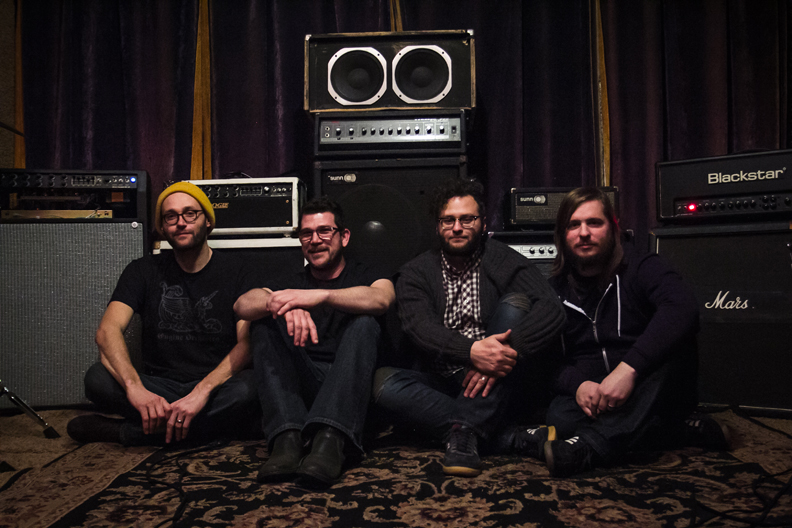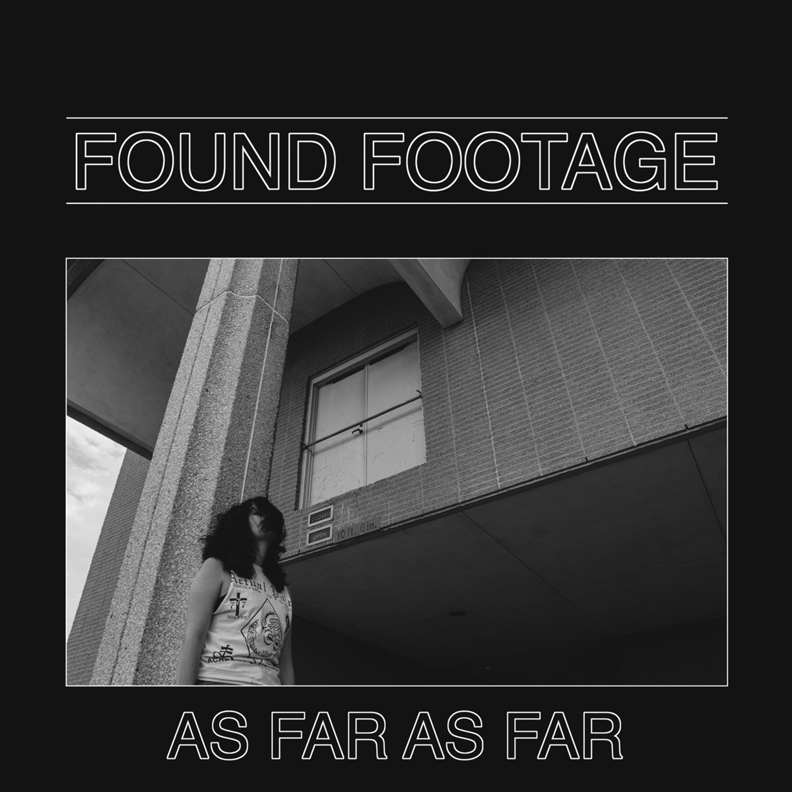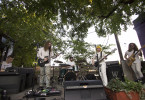Found Footage with Gentle Ghost, Cherry Death and Tonne
Saturday, March 28
Blue Note Lounge | Oklahoma City
The boys behind Oklahoma City act Found Footage are Yes men. Sure, the sound of As Far As Far — the vinyl release of which is being celebrated with Saturday night’s show at the Blue Note — plays well with the DIY punk renaissance currently making waves through the greater OKC metro, but guitarist/vocalist Garrett Blach, bassist Austin Tackett, drummer Aaron Tackett and guitarist Robby Harris love them some prog.
Formed out of the shells of Engine Orchestra and The Purple Church, Found Footage cranks out biting rock jams wired together with fragmented time signatures, acidic guitar barrages and artillery fire percussion. It makes for a grimy but approachable style, one that lures you in with some strong hooks then sucker punches you post-punk angst and a level of technical prowess you might not expect (and they humbly deny). To understand how this combination and As Far As Far came to be, we talked to Austin Tackett and Robby Harris a bit about crying, faux-indie garbage and being compared to Tool.
OK: Your release show lineup is stacked. Gentle Ghost just released a great new album, and Tonne and Cherry Death are really starting to win over listeners. Elsewhere, Power Pyramid, Sex Snobs and plenty more in that vein are doing big things. Does it feel like this DIY punk scene — or whatever you want to call it — is in a really good place right now?
Tackett: It’s in the best place I’ve ever seen it. There’s a new generation of really young kids who are piecing together an amazing network of DIY venues, bands, galleries and all the other elements necessary for a scene to thrive. I was only able to attend one night of the Everything is Not OK festival a few weeks back, but what I saw was so beautiful it almost made me cry. Never in my life did I think I would see so many cool people coming together as a community the way I did that weekend. I truly think it’s the most culturally relevant thing I’ve ever experienced in this city, and we’re only seeing the beginning of what’s to come.
Harris: We’re getting there. There are a lot of good bands in OKC that fall outside of the Red Dirt or Americana sound, which has flooded venues in our area. Most bands in our scene are very supportive of each other, which helps a lot with booking up and promoting.
OK: What do you think it is that is making it more conducive for bands like that to find a wider audience in Oklahoma, at least relative to the recent past?
Tackett: I think a combination of increased quality, hard work and availability are at the root of the current influx of great underground music here in OKC. But that said, I don’t think there’s much of a local audience beyond the small community that actually contributes to it. The recent past in OKC has been completely overrun with careerist, car-commercial, faux-indie garbage which, during its heyday, was overwhelmingly supported by an indifferent and nepotistic local media. Alternatively, it’s very refreshing to see some of our friends’ bands getting some attention as of late. The scene is certainly growing, but I think it has more to do with a new generation of kids finally replacing all the people who have aged out since I first started going to shows.
Harris: House shows and DIY venues are great for bands like us. It’s refreshing to play places that are a bit off the beaten path. People who attend these shows tend to pay a little more attention to the music, which is nice. It has given us a chance to meet a lot of people who are doing what they do for the love of it.
OK: By my estimation, Dust House plays a big part in that by not only producing great sounding records but becoming this kind of a stamp of approval for DIY punk bands in Oklahoma the way Burger Records is for garage rock bands in California. What about being a part of Dust House do you most relish? How do you think this endeavor has been most successful, to you, so far?
Tackett: While I’m flattered by your estimations, I think you might be giving us too much credit. Dust House’s mission is to help connect disparate factions of the music scene in OKC and give bands we like (including our own) easy access to studio time. In that respect, I think we’ve been very successful, but I think both Atlee (Hickerson) and I feel uncomfortable with the idea of being arbiters of taste or having any “stamp of approval” powers, so to speak. We just work with people we like creatively and personally, and if others are into it, then we’re incredibly thankful. As far as how it’s helped Found Footage, well, we got to take as long as we needed to record the album (thanks to Atlee), which was nice. Likewise, Dust House has given all of us the opportunity to meet so many people in the scene that we may have never known otherwise.
OK: Of course, you put out As Far As Far digitally back in September through Dust House. What about having this as a vinyl record is most special for you?
Harris: Owning physical media in a digital age is satisfying. I enjoy the feeling of putting a vinyl record on, flipping it at the halfway point — the entire experience. As far as it being our album, I can remember the night we received the physical copies. We were all really excited to be able to offer something tangible to the people who dig what we do.
OK: How would you say you’ve evolved as a band from where you started? Is this the kind of sound you always had in mind?
Austin Tackett: When we first started playing, there was no concrete idea of what the band was going to sound like. We knew we wanted to be a loud, punchy rock band, but that was the extent of it. What people hear on As Far As Far is just a natural evolution of all our tastes and ideas colliding, and most likely any future releases from the band will travel the same chaotic path. Having Robby join the band has started to slowly transition us from being a mechanized riff machine to actually having some soulful moments, so we just let the music land where it lands..
Robby Harris: Found Footage is known for being a tight, syncopated band. I feel that my style adds a little space to the sound. I think we’re becoming very cohesive as a band, and our new material reflects that. Not to sound cheesy, but I look up to the 3 other guys in this band. We work hard as a group, which in turn makes me a better guitar player.
OK: There’s certainly an indebtedness to prog that just about everyone will hear in these songs. Is that something you consciously brought into your sound or more of a organic thing that developed as you wrote?
Tackett: Most of us are way into bands like Yes and King Crimson, and I think there’s always a semi-conscious attempt at incorporating some of that into Found Footage. None of us are good enough at our instruments to actually pull it off, but I think those influences still show themselves in our emphasis on rhythm and tightness. Seriously though, when’s the last time you listened to Close to the Edge?
Harris: All four of us come from different backgrounds, and we all have quite different musical tastes. I think that’s beneficial for us as a band. As far as nods to prog, I think we just enjoy pushing ourselves musically, and prog and noise moments are outlets for us to do so.
OK: As far as it being your debut album, do you like that As Far As Far works is your sort of introduction to the world? What about this record as a whole are you guys most proud of and pleased with?
Tackett: I see it as a snapshot of what we were all up to at the time it was made, and for that reason it’s probably a fairly decent introduction to the band. I’m certainly proud of it, and I’m really proud that we were able to see it through production from beginning to end completely on our own.
Harris: AFAF rides the line between abrasive and accessible, which pretty much sums up Found Footage as a band. I think different people hear the album differently; it’s funny, we’ve been compared to all kinds of bands, from early Foo Fighters to Cursive, Modest Mouse and even Tool. I do not understand the last one.
OK: What sort of plans do you guys have for the rest of 2015?
Harris: Since the digital release of AFAF, we’ve written several new songs, which we are currently tweaking for our next record. We’ve also talked about doing a covers EP, possibly featuring some Dust House alumni. We also have ideas for a couple of themed one-offs, which will give us an opportunity to let some of our more obscure ideas see the light of day.






